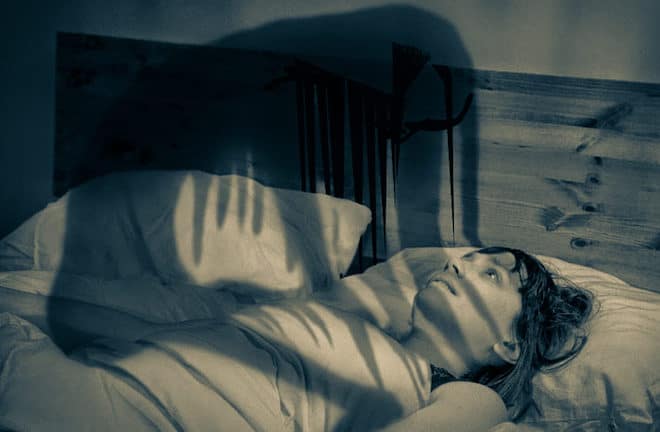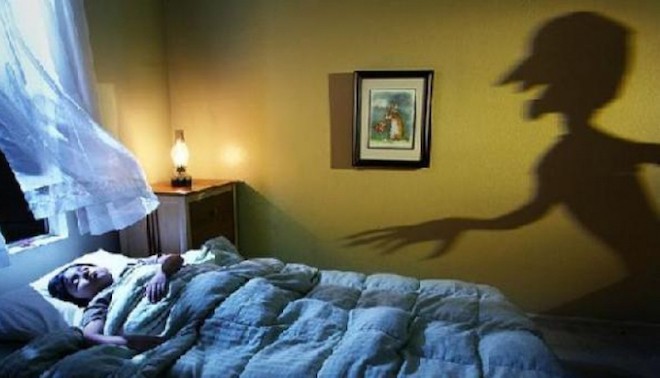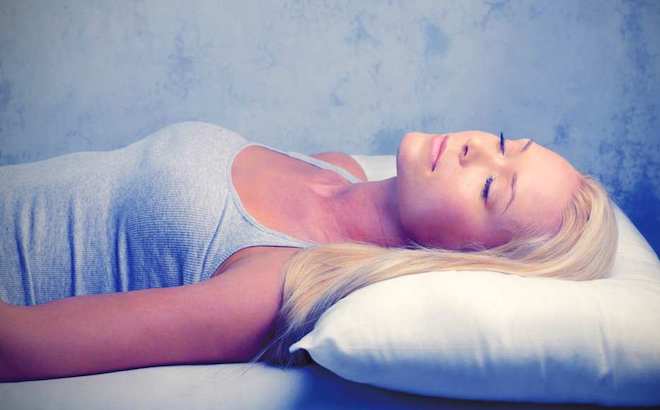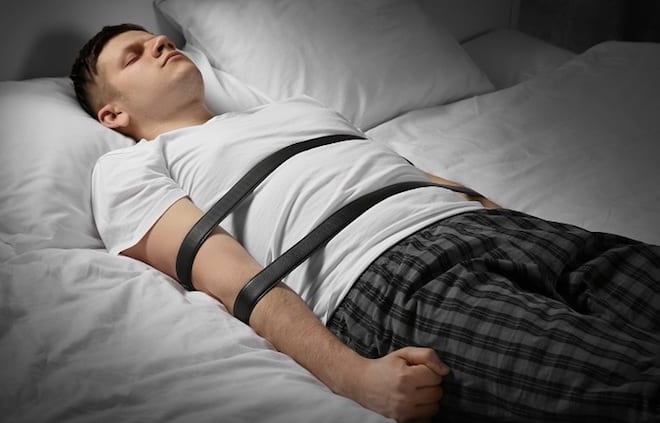In the past, sleep paralysis was explained mystically. “The brownie is strangling” among the Slavs, “naughty makura-gaeshi” among the Japanese - this naughty spirit caused the state of “kanashibari” (this is sleep paralysis), “the devil visits al-Jasum” among Muslims. The inhabitants of medieval Europe were the least fortunate: those prone to sleep paralysis were accused of being associated with demons - incubi and succubus, and fell into the hands of the Inquisition ...
Sleep paralysis - what is it?
Surprisingly, many modern people are so impressionable that they explain the attacks of sleep paralysis that happened to them with contact with aliens, the revenge of deceased relatives, or the actions of the same brownie and other evil spirits.
Another name for this phenomenon is curious: the syndrome of the old witch. It came from the belief that an aged witch cannot die until she transfers her magical power to someone, and sits on her “chosen one” on the chest in order to exclude the possibility of resistance.
What is nocturnal paralysis? And why do people come up with and come up with such unpleasant explanations for him? Is he really dangerous?

Types of sleep paralysis
Sleep paralysis of one kind or another affects about 40 people out of 100, both sexes equally, but most often it happens to people very young - from early teens to about 25 years of age.
There are two types of nocturnal sleep paralysis:
- Hypnagogic happens to a falling asleep person: muscle tone has fallen, the body is ready to fall asleep, but the consciousness is not turned off, it “slowed down”, and the person feels the impossibility of moving - this alone can cause panic;
- Hypnopompic, on the contrary, happens at the stage of awakening, after the stage of "rapid eye movement", in a state of extreme muscle relaxation, but high brain activity - a person sees dreams in this phase. Consciousness woke up - but no muscles, a signal from the brain would wake them up a little later. A person is not able to move - and inadequately assesses the passage of time: it seems to him that this difficult moment goes on and on.
The physiological mechanism of the "old witch syndrome"
What is sleep paralysis? This is the result of a mismatch in time between the activity of the body and consciousness: turning on / off the consciousness in the process of awakening / falling asleep and activity / blocking the functions of our muscular system. That is, consciousness begins to function while the body has not yet “turned on” after sleep, or continues to function when it has already “turned off”. That is why this state is realized by a person and at the same time frightens him.
This is a malfunction of the nervous system: in the normal state, both awakening and falling asleep occur imperceptibly for a person.
It can be said that sleep paralysis is the antipode of sleepwalking, when the body is awake and the mind is asleep. Sleep paralysis, on the other hand, blocks any possible movement of the body - the brain does this in order to protect the sleeper from himself. Specifically, so that a person does not begin to reproduce actions dictated by dreams.

Doctor of Sciences V. Kovalzon, who is on the board of the International Society of Somnologists, cites a case in the USA as an example: a husband strangled his wife in a dream. That is, his motor activity was not minimized after falling asleep, and he unconsciously reproduced what he saw in a dream - this was proven in court using the results of an MRI of this person, carried out by specialists in somnology.
Sleep paralysis: causes
What can provoke this condition? Unfortunately, these factors are part of our lives, some to a greater extent, some to a lesser extent:
- sleep-wake disorder (lack of sleep and oversleeping, fluctuating bedtime and wake-up times);
- chronic or episodic insomnia;
- acute and chronic stress conditions;
- the use of harmful substances and dependence on them (alcoholism, drug addiction, substance abuse);
- long-term use of drugs that affect consciousness - tranquilizers, antidepressants;
- heredity;
- sleep in a certain position - on your back (if you sleep on your stomach or on one side or another, sleep paralysis does not seem to threaten you).
Occasionally, sleep paralysis is a sign of other neurological disorders: it may be a companion of bipolar disorder or narcolepsy. Depression is out of the question. If he visits you too often, you should seek medical help.

Symptoms
What does night paralysis look like? Very unpleasant. The person feels:
- immobility - the inability to move even a finger;
- a feeling of suffocation, a feeling of heaviness and pressure on the chest, throat, stomach;
- auditory and visual hallucinations, especially in the dark - hears noises of unknown origin, steps, voices, pulsating sounds; sees vague images perceived as threatening;
- as a result, a state of horror, panic, doom arises - and there are violations of the heart and respiratory rhythms, muscle twitches, and distortion of the facial muscles.
Have a frightening experience of night paralysis and are terrified of the possibility of its return? Don't forget: you have nothing to fear! You won't die, you won't fall into lethargy, you won't go crazy! This state: safe and temporary. Remember this.
The video tells about sleep paralysis, its causes and ways to deal with this condition - narcologist Mikhail Tetyushkin:
Diagnosis with the help of the patient
How to get rid of an unpleasant "gift" in the form of sleep paralysis? If your condition causes you insurmountable anxiety, and night attacks do not give you rest, consult a doctor.
The doctor, as a rule, already diagnoses your condition correctly according to the description. Perhaps he will advise you to observe it yourself, namely, to write down everything that relates to it: the time of your falling asleep and waking up, your auditory sensations, visual images, possible nuances of your life that, in your opinion, can provoke an attack. This makes it easier to find the cause or complex of causes that led to regular attacks.
Perhaps, to clarify the diagnosis, you will be referred to other specialists - a somnologist, a neurologist. Polysomnography may be prescribed - a procedure for examining your sleepy state (most often, a polysomnogram does not show any oddities in connection with night paralysis - which means that it does not pose a danger to the body).
If the causes of your condition seem too serious to the doctor, he may also prescribe medication (usually antidepressants).
Do not try to self-medicate and take antidepressants on your own. These drugs are not harmless if they are taken according to the wrong scheme and in the wrong dosage, without the supervision of a specialist. You risk not only aggravating your condition, but also gaining additional “bonuses” in the form of side effects - and such strong remedies have a lot of them!

Treatment
Sleep paralysis does not imply any special therapy - if no other neurological disorders are detected. To prevent the possibility of seizures, the patient should try to eliminate daily risk factors. Most often, a change in lifestyle and daily routine is enough.
- Getting 8 hours of sleep a night is a necessity, not a whim, try to get enough sleep to get enough sleep.
- Fight hypodynamia - sports and outdoor work strengthen the connections between the centers of the brain and the musculoskeletal system, an imbalance between them and generates uncontrolled states.
- Avoid stress, respond philosophically to the inevitable - "everything passes, and this will pass", "everyone is alive, healthy - and fine."
- Learn how to properly go to sleep: no mental work, falling asleep under a working TV, computer toys before lights out. All activities before bedtime should only relax and soothe. Let it be a warm bath, massage, meditation, reading good books, music for relaxation - whatever suits you best.
- Be sure to ventilate the room where you sleep - in a stuffy room, you may dream, without any other factors, that you are in the dungeons of the Inquisition.
- Start an alarm clock and get up on it, do not "fall asleep" after the call, this is important: sleep paralysis can only occur during natural awakening!
Don't you think you can even ... thank sleep paralysis? He is, although not too pleasant, nevertheless a harmless sign: it's time to correct the wrong way of life!
 All about healthy sleep
All about healthy sleep